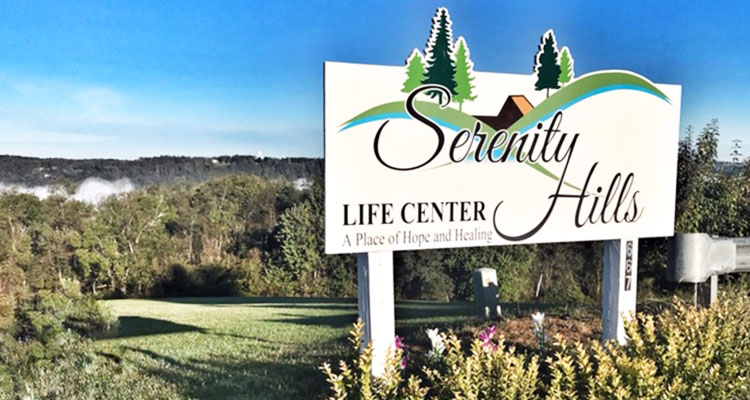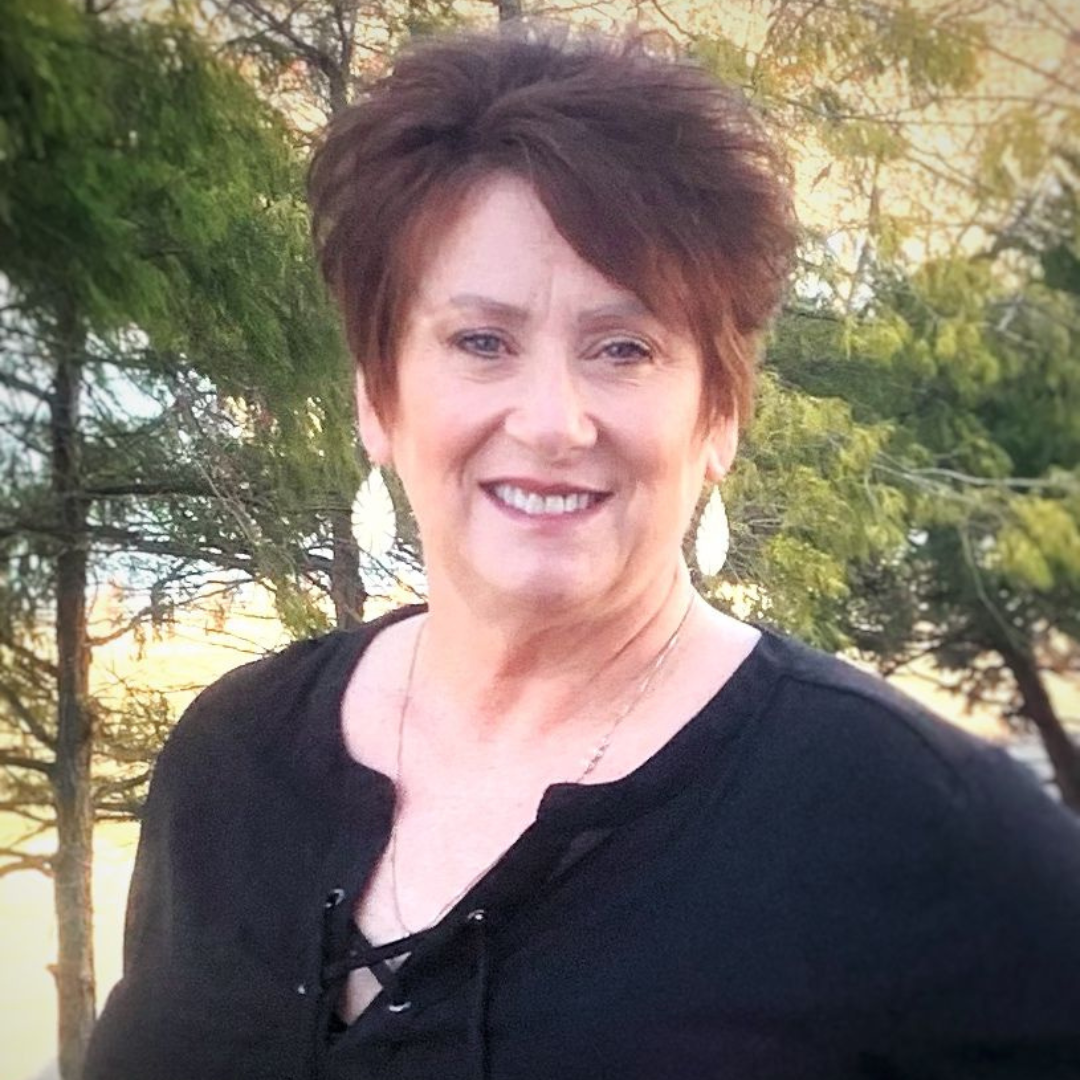All Sharon Travis was really looking for was a small house where a handful of her Living Free recovery ministry’s houseguests could live while in the early stages of recovery. A decent fixer-upper perhaps.“Hope begins in the dark, the stubborn hope that if you just show up and try to do the right thing, the dawn will come. You wait and watch and work: you don’t give up.” — Anne Lamott
What she ended up with was not one, but several large buildings and a nearly 150-acre campus on a hilltop in Ohio County. This summer, Serenity Hills Life Center opened on this tranquil, secluded campus.
SHARON’S VISION
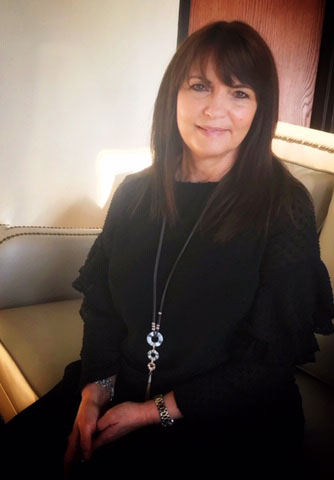
Sharon Travis, a devout Christian, has led a life filled with heartache and trauma. A child of divorced parents, she married an alcoholic at a young age. Travis lost a beloved nephew in an alcohol-related car accident. She also lives with a serious autoimmune disease. After escaping her first marriage and having a brush with death herself, Travis found her calling in caregiving.
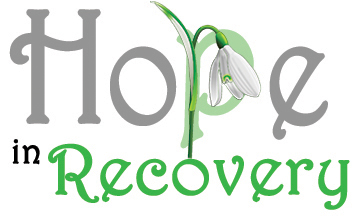 She founded Heart 2 Heart, a non-profit Christian ministry dedicated to visiting the sick and disabled and helping to provide for their physical, emotional and spiritual needs. Through her work with Heart 2 Heart, Travis became more knowledgeable about substance use disorder (SUD) and began working with those in recovery. This ministry led her to start Living Free, a non-profit Christian group that strives to help those suffering from life-hindering addictions.
She founded Heart 2 Heart, a non-profit Christian ministry dedicated to visiting the sick and disabled and helping to provide for their physical, emotional and spiritual needs. Through her work with Heart 2 Heart, Travis became more knowledgeable about substance use disorder (SUD) and began working with those in recovery. This ministry led her to start Living Free, a non-profit Christian group that strives to help those suffering from life-hindering addictions.
Travis, now remarried, often found herself taking Living Free clients in to stay at her family’s home. She found that many of the people she was helping were mothers with small children. One woman lost custody of her child and, devastated by the loss, was swallowed alive by her addiction.
“That mother-child bond is such a vital one,” Travis says. “It’s the motivation for many women to change for the better.”
She had a vision of starting a small residential community where women in early recovery could live with their children so that those crucial parental bonds could remain intact. Travis began searching for a modest house where she could make this dream a reality. However, despite her search, nothing seemed to work out in her favor. And over time, the sheer magnitude of the local and statewide opioid crisis made Travis realize that there was a need for hundreds of treatment beds.
PAUL XI PASTORAL CENTER
Several years ago, the Diocese of Wheeling-Charleston’s Paul XI Pastoral Center became available on the local real estate market. Travis saw the potential for the residential retreat center to be easily adapted for use as a recovery facility. It took years, but eventually, Travis’ Living Free group was awarded a grant from the West Virginia Department of Health & Human Resources supported by the Ryan Brown Addiction Prevention and Recovery Fund, which allowed her to renovate the center to expand her group’s treatment offerings. The funding allowed Serenity Hills to begin operations serving primarily West Virginia women suffering from SUD.
“It was the ‘perfect storm’ of circumstances that led to us getting this facility,” Travis shared.
The Ryan Brown fund was established by the West Virginia Legislature by the passage of House Bill 2428 during the 2017 legislative session. Brown was a young man from our state who died of an overdose in 2014. His grieving parents were instrumental in getting this act passed.
According to House Bill 2428, the West Virginia DHHR will collect public and private monies to maintain this funding and will handle the disbursement of these funds. Millions of dollars in proceeds from a Boone County civil action lawsuit settlement against opioid drug manufacturers and distributors initially created this fund with the intent of providing West Virginia with additional treatment facilities.
PEACE AND SERENITY
Serenity Hills certainly lives up to its name. The quiet, peaceful campus is nestled in a gorgeous rural setting that includes 15 miles of walking trails and a fishing pond. “I want this to be a place of peace,” Travis emphasizes.
The 72-bed licensed behavioral health facility is “person-centered,” according to Travis, meaning that there is no mandatory length of stay for treatment. Since the center opened in June, more than 30 women have entered the residential treatment programs offered there. Serenity Hills works with Northwood Health Systems, where many patients undergo a “detox” and stabilization phase before entering Serenity Hills. “We do not do detox here,” says Travis.
A number of the women in the program have since graduated and moved on to sober or independent living.
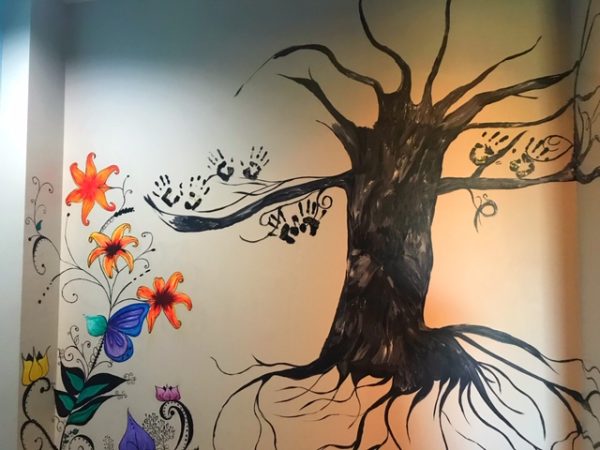
The program offers three levels of residential care. Level 3-5 is the highest level of care and is the level that those fresh from a detox program will enter. Level 3-5 requires 15 hours of weekly clinical services, including individual counseling, group therapy and life skills classes.
The intermediate treatment level is 3-1 and requires clients to utilize a minimum of five hours per week of clinical services. In order to step down to another level, a client’s treatment team must agree that the individual has met the required goals and is ready to move on. Weekly individual therapy using a variety of clinical methods is offered. Individual and group therapies offered include cognitive behavioral therapy, dialectical behavior therapy, conflict resolution group therapy, relapse prevention group therapy, trauma-focused therapy, grief therapy and 12-step program facilitation. The clinicians utilize a motivational interviewing counseling style with the clients. This technique, often used by addiction counselors, helps clients find motivation for positive change within themselves.
In the coming months, Serenity Hills plans to add family therapy to its already robust menu of services.
When a client arrives at the residential unit, she is asked to bring only specified items of clothing in a plastic bag. All other necessities — meals, health and hygiene products, snacks — are provided by Serenity Hills. “Everyone is on equal footing here,” says Travis. “I do not want to create a situation where there are the ‘haves’ and the ‘have nots.’”
The facility boasts a chapel, meditation area and fully equipped workout room. There are instructors who lead the women in pursuits, such as yoga and obstacle courses. A goal at the center is to help each woman find a favorite hobby, so various crafts such as crocheting are taught.
As previously mentioned, clients are required to participate in a set number of mandatory clinical service hours. In addition, each woman is offered the opportunity to participate in elective courses, which can include spirituality classes and services, health and wellness activities or college courses offered through a partnership with West Virginia Northern Community College.
Travis notes that although spirituality electives are offered, the program itself is not faith-based. In the near future, a massage therapist and acupuncturist will be added to the staff. “We treat a person wholistically; mind, body and spirit,” says Travis. In addition to mandatory and elective groups, residents are also required to attend Narcotics Anonymous and/or Alcoholics Anonymous meetings.

Once a client has proven herself to be committed to tackling her demons and has passed through both levels 3-5 and 3-1, she can choose to spend the next phase of her recovery in Serenity Hills’ newly opened sober living home. This house can accommodate up to 12 women who live independently with continued accountability but more freedom. Residents of the house are required to be employed and able to pay their monthly rental fee. They are also required to attend weekly NA or AA meetings. Of course, clients at any level are required to remain drug- and alcohol-free at all times. Additionally, no smoking is allowed on the campus.
HELPING HANDS
The staff working at Serenity Hills is dedicated to helping their patients change their lives for the better. Some staff members are in recovery themselves and have been specially trained as “peer specialists” to help mentor and counsel those new to the journey.
For the past few months, these peer specialists have been working with the Wheeling Police Department on overdose calls. According to Wheeling Police Chief Shawn Schwertfeger, there have been 126 overdoses within city limits so far this year.
“This is trending about 20 percent higher than 2018,” says Schwertfeger. He states that there were 132 overdoses in our city in 2018, with 15 of those resulting in death.
When the police respond to an overdose, a peer specialist is also called to the scene to meet with the overdose victim. The goal is to try to guide him or her into a suitable treatment program. Travis tells Weelunk that the program is working.
“Sometimes, the overdose victim is too sick at the moment to consider treatment, but we follow up by contacting them later,” she says. “Those follow-up calls have been successful in getting some people into treatment.”
Schwertfeger concurs that the program is working well. “Serenity Hills has responded to roughly 85 percent of our total overdoses,” he states. “The program has been wonderful, and their staff have done a very nice job. We are very pleased with the partnership with Serenity Hills. The program did not cost us anything and provides the follow-up necessary that police officers just do not have time or the necessary skill set to provide. I am appreciative of the work of Serenity Hills and proud of the response by WPD officers in making the program work.”
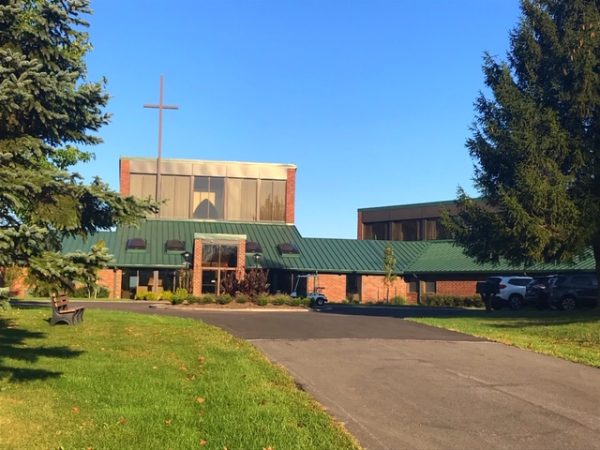
Serenity Hills also works with Project HOPE to get those suffering from SUD off the streets and into a treatment program. Dr. William Mercer, health officer for the Wheeling-Ohio County Health Department and street medicine physician for Project HOPE, also serves as the staff doctor for Serenity Hills.
The facility’s clinical staff is headed up by Clinical Director John Antal, MSW, LICSW. He brings many years of experience in social services to his role, having worked most recently at the Robert C. Byrd Child & Adolescent Behavioral Health Center. “All of our therapists are masters-level therapists with a unique ability to get these women to open up,” Antal shares. “We have a great team.”
WHAT’S NEXT?
Now that Travis’ longtime dream has become a reality, what does the future hold?
“The next step is to open a house on campus for pregnant women and mothers with children,” she states. In order for this important next step to occur, additional funding will be needed. If you’d like to read more about Serenity Hills’ programming or make a donation toward this important work, you can do so by visiting the facility’s website.
In the summer, Serenity Hills was operating at a trial level, purposely keeping their numbers low until they are fully functional and running like clockwork. In the next few weeks, they will be listed on several national websites such as the U. S. Department of Health & Human Services’ Substance Abuse and Mental Health Services Administration (SAMHSA) site. Once information about their services is pushed to a bigger audience, Travis anticipates a major uptick in their census numbers.
• A lifelong Wheeling resident, Ellen Brafford McCroskey is a proud graduate of Wheeling Park High School and the former Wheeling Jesuit College. By day, she works for an international law firm; by night, (and often on her lunch breaks and weekends) she enjoys moonlighting as a part-time writer. Please note that the views expressed in her writing are solely her own and do not necessarily reflect those of anyone else, including her full-time employer. Through her writing, Ellen aims to enlighten others on causes close to her heart, particularly addiction, recovery and equal rights. She and her husband Doug reside in Warwood with their clowder of rescued cats, each of whom is a direct consequence of his job as the Ohio County Dog Warden. Their family includes four adult children, their spouses and several grandkids.


